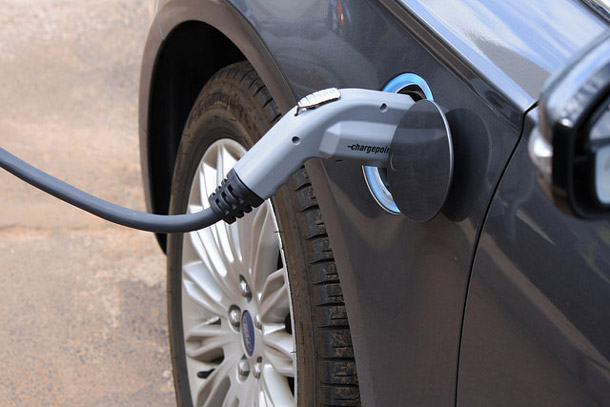Zapping the Electric Car Tax Credit
Air Date: Week of November 10, 2017

Electric vehicles generally outperform gasoline cars in terms of equivalent mileage, even when the electricity comes from grids with high numbers of coal-powered plants. (Photo: Noya Fields, Flickr CC BY-SA 2.0)
If enacted, a House Republican tax plan would end the $7500 electric vehicle tax credit, a program that has spurred a boom in EV model sales. Union of Concerned Scientist policy analyst Joshua Goldman discusses the subsidy with Host Steve Curwood and what this could mean for the electric car market.
Transcript
CURWOOD: It’s Living on Earth, and I’m Steve Curwood.
While a string of Democratic and center-left victories at the ballot box November 7th may have dimmed the prospects of a tax overhaul proposed by US House Republicans, the battle is far from over. And one proposed provision that is sparking opposition would eliminate the $7,500 federal tax credit for electric vehicles like the Tesla Model 3 and the Chevy Bolt.
Another clause would also shrink wind tax credits and solar tax incentives, while China has said it will boost its renewable energy spending over the next two decades to more than $360 billion. US solar and wind subsidies have gone up and down over the years, but eliminating the tax credit for electric cars could jolt the EV business and set it back.
Joshua Goldman is a Senior Analyst for the Clean Vehicles Program with the Union of Concerned Scientists, and he’s on the line now from Washington. Welcome to Living on Earth.
GOLDMAN: Thanks, Steve. Thanks so much for having me.
CURWOOD: So, talk to me about the $7,500 dollar federal tax credit for electric vehicles. When was this credit first put in place, and what was the economy like for electric vehicles before then?
GOLDMAN: Well, the tax credit arguably is the single most important federal policy we have on the books that is supporting the electric vehicle market. Since this credit was enacted '08, the electric vehicle market has grown from just two models to over 30 models that people can choose from in dealerships across the country, and we're seeing multiple brands now get involved in the EV market, so it's not just Nissan and Chevy, it's also GM and BMW and VW and Kia and of course Tesla, and a suite of other automakers are now beginning to offer electric vehicles at different price points that can appeal to different consumers, and so the tax credit has really spurred a lot of that innovation, and it has allowed the US to become a leader in electric vehicle deployment and sales, but that leadership is really in jeopardy now that the tax credit is on the chopping block in the House tax plan.

A filling station with “juice” for electric cars. (Photo: PapJeff, Flickr CC BY-NC 2.0)
CURWOOD: So, what are economists and experts predicting will happen if what the House is proposing actually becomes law, and this incentive in America for electric cars goes away?
GOLDMAN: Sure. I mean that's hard to predict exactly what's going to happen. There still is a lot of excitement around electric vehicles but it's pretty clear that the removal of federal support for electric vehicles will impact EV sales. I mean, one of the reasons that EVs are still only gaining market acceptance now is that they still are slightly more expensive than a comparable gasoline vehicle. And so the tax credit really helps bridge that price gap. One interesting example for what can happen to EV sales can be found in Georgia which also had a state tax credit for electric vehicles on top of the federal tax credit, and when the Georgia legislature removed the $5,000 dollars state tax credit for electric vehicles, electric vehicle sales dropped an estimated 90 percent in the state.
CURWOOD: So, now, what statistics do you have on the carbon emission benefits of electric vehicles?
GOLDMAN: UCS looked at that question in depth, and the emissions of an electric vehicle vary across the country, and they depend on where you live because they depend on your electricity mix. So, if you live in an area of the country that has a relatively dirty electricity grid, then the emissions profile of an EV is going to be different than if you lived in an area of the country that has a relatively clean electricity grid.
So, UCS examined all the different electricity grids across the country, and we found that no matter where you live in the country an electric vehicle is going to provide better emissions performance than a comparable gasoline vehicle. So, if you live in a place like upstate New York which has a lot of hydro power, we found that driving an electric vehicle in that region produces the emissions equivalent of a hypothetical gasoline vehicle that gets 135 miles to the gallon. Now, if you live in the Pacific Northwest, that equivalent is 94 miles per gallon, if you live in Texas it's 52 miles per gallon, and it sort of varies across the country.

Joshua Goldman is a Senior Analyst with the Union of Concerned Scientists. (Photo: Union of Concerned Scientists)
CURWOOD: This proposed tax bill is a massive overhaul of the federal tax structure and many elements of it, but what's the rationale of the writers of this bill for getting rid of the tax credits for electric cars?
GOLDMAN: Well, I certainly didn't write the bill, but I assume that it that they are eliminating the electric vehicle tax credit as a cost-saving measure, but that doesn't make a lot of sense when you look at how much this credit has actually cost the American public and the benefits that electric vehicles provide for American consumers. So, for example, in fiscal year 2015, the EV tax credit cost America $580 million dollars. OK? Now by comparison the tax credits that we give to the fossil fuel industry cost us $4.7 billion dollars every year, so if you look at how much we're spending on electric vehicles versus how much we're responding subsidizing the oil and gas industry, it's not even close.
CURWOOD: Joshua Goldman is a Senior Policy and Legal Analyst for the Union of Concerned Scientists. Thanks so much for taking the time with us today.
GOLDMAN: Thanks so much. This was great.
Links
Federal Tax Credit information
NYTimes: “Six Charts That Help Explain the Republican Tax Plan”
Living on Earth wants to hear from you!
Living on Earth
62 Calef Highway, Suite 212
Lee, NH 03861
Telephone: 617-287-4121
E-mail: comments@loe.org
Newsletter [Click here]
Donate to Living on Earth!
Living on Earth is an independent media program and relies entirely on contributions from listeners and institutions supporting public service. Please donate now to preserve an independent environmental voice.
NewsletterLiving on Earth offers a weekly delivery of the show's rundown to your mailbox. Sign up for our newsletter today!
 Sailors For The Sea: Be the change you want to sea.
Sailors For The Sea: Be the change you want to sea.
 The Grantham Foundation for the Protection of the Environment: Committed to protecting and improving the health of the global environment.
The Grantham Foundation for the Protection of the Environment: Committed to protecting and improving the health of the global environment.
 Contribute to Living on Earth and receive, as our gift to you, an archival print of one of Mark Seth Lender's extraordinary wildlife photographs. Follow the link to see Mark's current collection of photographs.
Contribute to Living on Earth and receive, as our gift to you, an archival print of one of Mark Seth Lender's extraordinary wildlife photographs. Follow the link to see Mark's current collection of photographs.
 Buy a signed copy of Mark Seth Lender's book Smeagull the Seagull & support Living on Earth
Buy a signed copy of Mark Seth Lender's book Smeagull the Seagull & support Living on Earth

